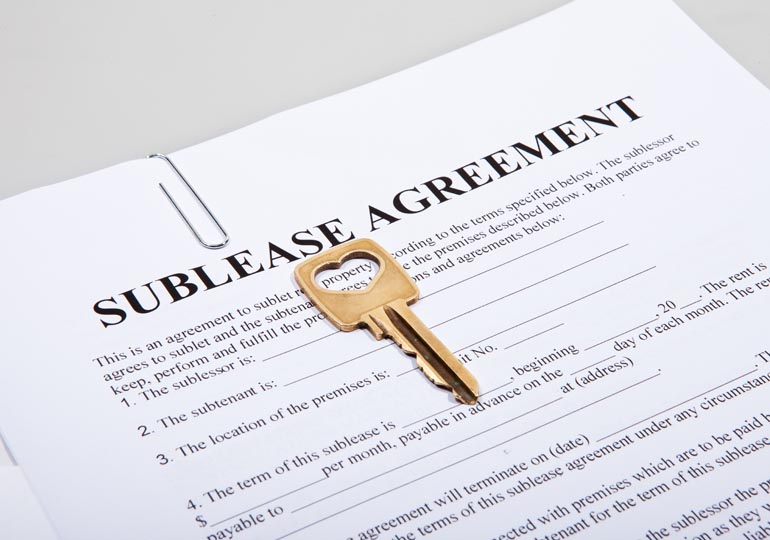Before the COVID-19 pandemic, many business owners paid little attention to subleasing and assignment provisions when negotiating commercial leases. It was common to focus on rent, maintenance, taxes, and insurance, which affect a tenant’s bottom line, and options to renew the lease if the business thrives. Recently, however, one of the top concerns of commercial tenants is flexibility in case they no longer need to use a portion, or all, of the leased space. In this context, subleasing and assignment provisions are key deal terms.
The Difference Between Subleasing and Assignment
A sublease does not alter the relationship between the landlord and the tenant, who remains liable for all of the tenant’s obligations under the lease. However, the tenant enters into a subordinate lease (the sublease) with a subtenant regarding a portion, or all, of the leased space. After a sublease is signed, the landlord interacts with the tenant, and the tenant interacts with the subtenant.
An assignment alters the relationship between the landlord and the tenant by assigning the tenant’s rights and obligations from the first tenant (the assignor) to the second tenant (the assignee). The assignee steps into the shoes of the assignor, and has a direct contractual relationship with the landlord. After an assignment of the lease, the landlord interacts directly with the assignee.
Important Deal Points Regarding Subleasing and Assignment
Leases may include many provisions regarding subleasing and assignment. Some of the most common issues include the following:
- In what circumstances is landlord consent required? Leases typically require the landlord’s consent for any sublease or assignment. However, some leases have different provisions for special circumstances, such as subleasing or assignment to a related entity, or assignment of the lease in connection with the sale of the tenant’s business.
- What is the standard for landlord consent? Provisions that require the landlord’s consent may be followed by a standard such as “in the landlord’s sole discretion,” or “which may not be unreasonably withheld.” Obviously, the second standard is more favorable to the tenant. However, as a practical matter, if a dispute arises regarding whether a landlord’s denial was reasonable or unreasonable, arbitration or litigation would be expensive, the outcome would be uncertain, and the prospective subtenant or assignee may be unwilling to wait to see how the dispute is resolved.
- What information must be provided regarding the proposed subtenant or assignee? Many leases require confidential financial information regarding the proposed subtenant or assignee. The proposed subtenant or assignee may be more comfortable providing information if the lease contains confidentiality and non-disclosure requirements to restrict the landlord’s use of the information. An argument can be made that less information should be required regarding a proposed subtenant than a proposed assignee, because the landlord will not enter into a direct contractual relationship with the subtenant and the tenant will remain liable under the lease.
- What are the landlord’s alternatives? A tenant might assume that if the tenant requests consent to a sublease or assignment, the landlord’s alternatives will be limited to granting or withholding consent. However, many leases give the landlord a third alternative, to cancel the lease if the tenant requests a sublease or an assignment. This is known as a right of recapture.
- When is the landlord’s response due? Some leases do not set a deadline for the landlord’s response to a request for consent to a sublease or assignment. A delayed response would prevent the tenant from moving forward until the response is received. A delayed response also may result in a lost opportunity, if the proposed subtenant or assignee is under time constraints.
- What is the effect if the landlord fails to provide a timely response? A lease may provide that if the landlord fails to respond to a request for consent within a specified period of time, then consent is deemed granted, or a lease may provide that in such circumstances, consent is deemed denied. The first alternative is more favorable for a tenant, but the prospective subtenant or assignee might not be willing to rely on a “deemed consent” provision and may require actual consent before moving forward.
- What are the landlord’s remedies if a sublease or assignment is made without requesting consent? Generally, if a tenant subleases or assigns a lease without obtaining required consent from the landlord, then the tenant is in default and the landlord can exercise all remedies under the lease. The lease also may provide that a sublease or assignment without the landlord’s consent is invalid and unenforceable.
- Will the assignor be released from liability for the tenant’s obligations after an assignment? It may seem like common sense that if a lease is assigned with the landlord’s consent, then the original tenant (assignor) will no longer be responsible for the tenant’s obligations under the lease. However, a lease may provide that the assignor will remain liable under the lease after an assignment. Similarly, the landlord’s written consent may state that both the assignor and the assignee will be responsible for the tenant’s obligations after the lease is assigned. In order to be released, the assignor should obtain a written agreement from the landlord stating that after an assignment, the assignor will no longer be responsible for the tenant’s obligations under the lease.
- Will a guarantor be released from liability for the tenant’s obligations after an assignment? Many landlords require a personal guaranty from an individual, or a corporate guaranty from a related entity, to ensure payment of the tenant’s obligations under a commercial lease. Guarantees typically provide that they will remain in effect even if the lease is assigned. However, the tenant may be able to negotiate for the termination of the guarantee in the event that the lease is assigned. In some cases, the landlord may require a substitute guarantor.
- What is the effect of subleasing on the obligations of the tenant and the guarantor? A sublease does not affect the tenant’s obligations to the landlord under the lease, or the guarantor’s obligations to the landlord under the guaranty.
If a business owner is considering entering into a new lease, it is important to carefully review the subleasing and assignment provisions and negotiate any necessary changes before signing the lease. If a tenant desires to sublease or assign an existing lease, it is important to review the applicable requirements and restrictions before taking any action. An experienced real estate attorney can assist the tenant by spotting issues, explaining alternatives, and negotiating with the landlord to help the tenant accomplish its business objectives.


